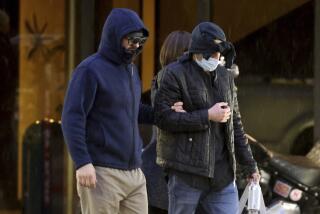Russian Calls Swiss Verdict a Win for Fellow Businessmen
- Share via
MOSCOW — A smiling Sergei Mikhailov, cleared of charges in Switzerland that he heads a powerful Russian mafia gang, returned home Saturday evening and praised the court verdict as a victory for all Russian businessmen.
“This trial is a bright testimony to the fact that Russians are not necessarily criminals,” Mikhailov told reporters who met him at the airport. “They can be businessmen who contribute to the development of the economy in Russia.”
Mikhailov, who spent more than two years in jail awaiting trial, had been the target of a multinational law enforcement effort aimed at curtailing the spread of Russian criminal groups throughout the world.
He comes home a free man whose business practices have been given a clean bill of health.
The court decision was a major defeat for Swiss prosecutors, who received help from Interpol, the United States and other countries in building their case. They had charged that Mikhailov was the chief of the ruthless Solntsevo gang, said to be the largest of Russia’s criminal groups.
Mikhailov, 40, countered that he was an ordinary businessman who had moved to a village near Geneva, where he lived while conducting legitimate business in Europe.
Swiss authorities had no comment on Friday’s verdict, but they kept Mikhailov in jail overnight before putting him on a plane to Moscow on Saturday, saying he did not have proper documents to remain in Switzerland.
Legal analysts said the main weakness in the case against him was that prosecutors attempted to prove he was a mafia chieftain rather than presenting evidence proving that he had committed specific criminal acts.
“The trial showed that having a million-dollar bank account and being seen in the company of questionable characters doesn’t make you a crook, let alone a mafia don,” said Nikolai Nikolayev, crime reporter for NTV television. “The evidence fell to pieces.”
During the eight-day trial, Mikhailov was also acquitted of charges of laundering money and falsifying evidence. He was found guilty of violating a Swiss law that prohibits a nonresident from buying property, but the court--apparently taking into account his time already served--said he would face no further punishment.
“It’s the most important day of my life,” Mikhailov told the judge and jury Friday after the verdict. “You proved that democracy and justice are alive in this country. My heart is full of gratitude, and I’d like to send each of you a letter and to write on each line that I love you, I love you, I love you.”
On his arrival in Moscow, a triumphant Mikhailov flashed the V sign to waiting television cameras and paused to talk with reporters about his acquittal and the general problem of crime in Russia.
“Economic problems in Russia are tied to problems of crime in a quite concrete way,” he said. “A well-fed person who gets his paycheck on time, who’s sure that he will not lose his job tomorrow, will never commit a crime.”
The FBI, Interpol and governments across Europe are concerned about the rapid rise of Russian criminal groups since the breakup of the Soviet Union.
Well funded and well organized, they operate across international boundaries with impunity and engage in a wide range of crimes, including running prostitution rings, selling narcotics and carrying out contract murders.
“The verdict sends a very alarming and discouraging signal,” said Arkady I. Vaksberg, an author and Russian crime expert. “Great values of democratic justice such as presumption of innocence shouldn’t be questioned, but I think, before it is too late, the world should start thinking about new antidotes to such a serious virus as organized crime.”
Mikhailov was arrested in October 1996 at the Geneva airport as he was returning from what he said was a business trip. He was carrying three passports, including a Costa Rican diplomatic passport, authorities said.
The Swiss government kept him locked up as they worked to build a case against him.
One prosecution witness was shot to death in Amsterdam last year. A top Russian police investigator who received death threats while working on the case was granted asylum by Switzerland so that he would testify in the case.
“The trial proved to us that today’s Russia is more closed and frightening than ever before,” said an editorial in Saturday’s edition of the Geneva newspaper Le Temps. “We cannot help but think of all those scared people who hoped, for a fleeting moment, that the terror and chaos they had been living with would come to a close in Geneva.”
Swiss officials gave no indication of whether Mikhailov’s acquittal could set back the case against Ukrainian opposition leader Pavlo Lazarenko, a former prime minister who was arrested earlier this month when he tried to enter Switzerland using a Panamanian passport.
Authorities are reportedly investigating charges that he stole $20 million from the Ukrainian government and put it in a Swiss bank account.
“The only body that profited from the Mikhailov case is Russian law enforcement,” said Nikolayev, the NTV reporter. “They knew they would win either way: If Mikhailov was found guilty, they would have taken credit for supplying evidence. Now that Mikhailov walks away, they can point their finger and say, ‘You see, even in Europe they can’t do anything with these guys.’ ”
Sergei L. Loiko of The Times’ Moscow Bureau and special correspondent Helena Bachmann in Geneva contributed to this report.
More to Read
Sign up for Essential California
The most important California stories and recommendations in your inbox every morning.
You may occasionally receive promotional content from the Los Angeles Times.










